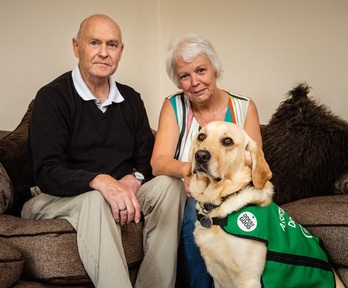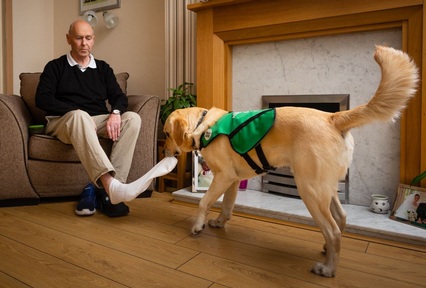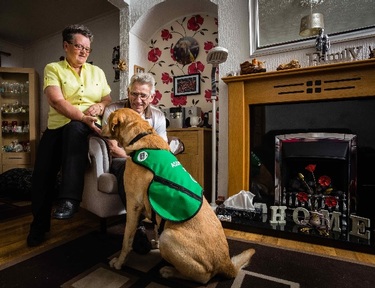'We would have no life without the dog' - how dementia dogs change people's lives
Highly trained dementia dogs with full public access rights are proving to be invaluable support for families living with dementia in Scotland as they literally open the doors to independence and confidence.

The Dementia Dog Project based in Dundee carefully select dogs to undergo a two-year intensive training programme. Once trained, the dogs are placed with selected families to provide emotional, practical and social support.
With an estimated 850,000 people diagnosed with some form of dementia in the UK, each dementia dog costs around £25,000 to train. Compare this to the cost of live-in care which can be up to £2,000 a week.
'We create a happy and trusting bond between the dog and the couple'
Fiona Corner, project manager for The Dementia Dog Project told homecare.co.uk: “The dogs start their training at eight weeks old in a training base in Oxfordshire and a bit like a guide dog, their first year is socialisation and obedience.
“When the dogs are a year old, a team will look at the personality of the dog and define whether the dog can go onto the dementia programme. At a year and a half, the dogs go through more training to see which specialist programme they will go onto.”
The dogs that travel to Scotland after successful training in Oxfordshire go on to be dementia assistant dogs and learn skills specific to dementia. Training includes responding to a buzzing of an alarm to fetch medication, waking a person up in the morning, as well as how to nudge someone to get out of bed and open doors.
Ms Corner said: “All the dogs are trained similarly but when we match a dog to a family, we go out and meet that family lots of times to get a real insight into their individual needs and the types of environment they might visit in the community.
“We try to mirror the dogs training with the individual. We take the dogs to similar environments or local area, so the dog gets used to that area. We start to train the dog in that particular skill, so we create a happy and trusting bond between the dog and the couple.”
Uno can detect when Mr Rankin's sugar levels are low and remind him to take his medication
To apply for an assistant dog, The Dementia Dog Project specifies the person must reside in Scotland and has a diagnosis of early-stage dementia and the person lives at home with a full-time carer so the dog’s welfare is a priority.

Today The Dementia Dog Project has 11 working dogs living with families around Scotland.
Henry Rankin, a retired police officer was diagnosed 10 years ago with vascular dementia. Henry and his wife Anne have been living with their dog Uno since May 2018.
Henry said: “I got in touch with The Dementia Dog Project and did three months training with Uno. I was worried I would forget all the commands, but my wife was also involved in the process, so she helps with the commands.”
Henry also has diabetes and thanks to Uno’s amazing senses, he can detect when Henry's sugars are low. Uno will go over to Henry and put his head on his lap to prompt him to test his levels.
Anne said: “His insulin levels have stabilised simply because he doesn’t forget to take his medication, thanks to Uno.”
Anne feels confident leaving the house knowing her husband is safe and Henry has managed to visit his daughter in London. Uno travels on the plane with Henry, lying at his feet throughout the flight.
“I keep his jacket on so that people know he is a working dog. Uno keeps my independence.”
“Uno has been everywhere with me. We’ve flown down to London five or six times. He’s been on a train and a bus.”

In another success story, Ken was diagnosed with vascular dementia nine years ago. He could not accept this diagnosis and withdrew from the world.
Ken’s wife Glenys felt her relationship with her husband was changing so quickly and she was becoming more of a carer than a wife.
With Kaspa, Ken can live at home with no additional support
Glenys said: “We’ve had Kaspa now for over six years and I can say that life is great, absolutely great. I can honestly say we would have no life without the dog.
“When Ken gets emotional, Kaspa goes and puts his head on Ken’s lap and when Ken gets angry, Kaspa is there with a toy to play with.
“He is so important to us. Kaspa just covers the frustration and I trust Kaspa so much when I go out, I depend on him.”
Ms Corner said: “Ken’s been living at home with no additional support and for me, the big benefit in that is that he had another six years at home living a pretty good quality of life.
“Obviously, there is deterioration, that’s the aggressive nature of the condition but to be able to extend the period of time living at home and all the benefits that come with that is something quite remarkable.”
The Dementia Dog Project dogs are recognised by their green working jackets which clearly display the Dogs for Good and ADUK (Assistance Dogs UK) logo.
The dogs have full public access rights, enabling them to support and accompany their owners wherever they go. This includes public transport, doctors, hospital appointments, cafes, restaurants and shops.
Ms Corner said: “The dogs have public access rights the same as guide dogs. This actually gives them more confidence so they can go to different places. They can go almost anywhere apart from food preparation areas or operating theatres.”
This pioneering project started back in 2009 when Alzheimer’s Scotland was working with a group of design students from the Glasgow School of Art.
“They were commissioned to look at innovative ways to support people with dementia in the absence of a carer. Out of their brainstorming, the idea of training a dog was established. In 2012, we formed a collaboration with Dogs for Good charity,” says Ms Corner.
The Community Dog Programme can reduce isolation and gain confidence
The Dementia Dog Project has also launched a pioneering programme called Community Dog Programme where trained dogs and handlers work alongside healthcare professionals and support workers to help people with dementia.
The pilot scheme is currently working in Gloucestershire, Hertfordshire and Oxfordshire and four areas in Scotland.
Ms Corner said: “We’ve used animals for therapy on a one to one with people who perhaps live on their own or live in a flat and are unable to have one of our assistance dogs or just might not want a dog full-time.
“We’ve got three trained teams with dogs and they go through the same level of training as an assistant dog. They will go out and run therapy sessions will work alongside healthcare professionals and support workers.
“Reducing someone’s social isolation and motivating them to go out for a walk is the end goal. We can help them to reconnect back into a social group in the community that they have lost the confidence to continue going to.”
To find out more about The Dementia Dog Project or to donate click here
click here for more details or to contact Alzheimer Scotland - Action on Dementia
Latest News
 29-Jul-24
Dementia Bus gives carehome.co.uk staff insight into life with dementia
29-Jul-24
Dementia Bus gives carehome.co.uk staff insight into life with dementia
 27-Jul-23
UK's top home care agencies in 2023 revealed
27-Jul-23
UK's top home care agencies in 2023 revealed
 30-Nov-22
A quarter of older people keep their falls secret from family
30-Nov-22
A quarter of older people keep their falls secret from family
 29-Nov-22
'Covid-19 has not gone away' say terminally ill
29-Nov-22
'Covid-19 has not gone away' say terminally ill
 28-Nov-22
IT consultant who received poor care opens 'compassionate' home care business
28-Nov-22
IT consultant who received poor care opens 'compassionate' home care business